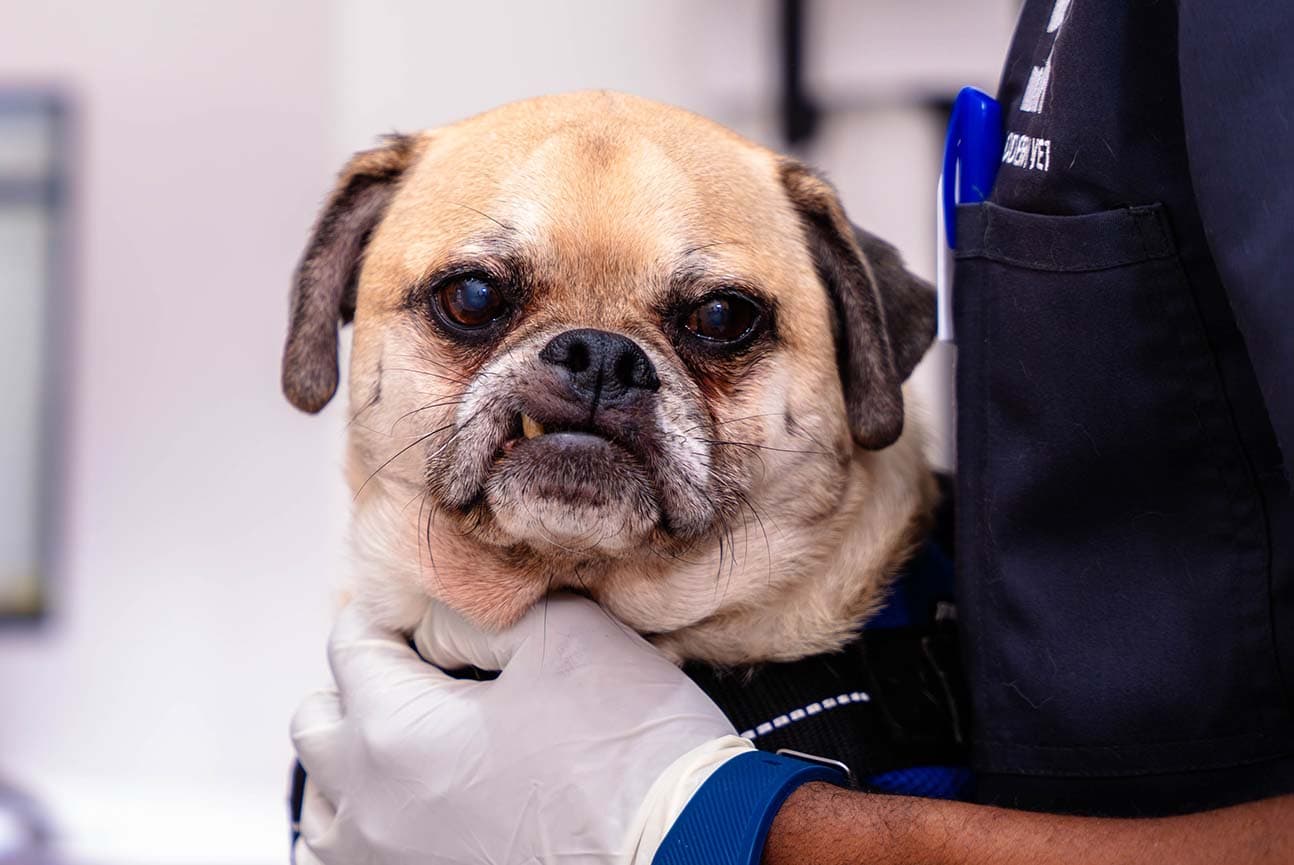Reviewed by Dr. Tetiana Filenko
Updated on 01/10/2025
Reading time 4 min.
Overview
Severity: Low
Life stage: All
Periodontal disease is the most common type of mouth disease in dogs, affecting more than 80% of dogs over two years old. In Dubai’s hot, dry climate, this condition can progress faster due to reduced saliva production from dehydration. The disease combines gingivitis and periodontitis, resulting in pain, tooth loss, and potentially life-threatening illness if bacteria enter the bloodstream.
What is periodontal disease in dogs?
Periodontal disease combines two related conditions:
- Gingivitis: inflammation and infection of the gums; the first stage of dental disease
- Periodontitis: advanced disease affecting ligaments and support structures of the tooth
The process begins when bacteria and food particles create a sticky film called plaque on your dog’s teeth. Without regular removal, plaque hardens into tartar (calculus), which accumulates under the gums and causes inflammation.
Dubai’s climate can worsen this process, as dehydration reduces saliva production, which is your dog’s natural defence against bacteria. Left untreated, bacterial infection always progresses to bone destruction and tooth loss, with bacteria potentially entering the bloodstream through inflamed gums.
Symptoms
Changes in the appearance and smell of your dog’s mouth and eventually in their behaviour:
- Yellow, brown or grey buildup on teeth: plaque and tartar
- Bad (smelly) breath
- Red, swollen gums: especially visible on the cheek-facing side
- Drooling and/or blood in saliva
- Signs of pain: pawing at their face, less interest in food, behavioural changes
- Difficulty eating or dropping food whilst chewing
In Dubai’s social pet culture, persistent bad breath is often the first thing owners notice, as it affects close interactions with family and friends.
Risk factors
Any dog can develop periodontal disease, but certain factors increase the risk:
Age: Plaque and tartar build up over the years, making older dogs more vulnerable.
Diet: Soft or sticky foods cling to teeth, encouraging plaque and bacteria.
Anatomy: Crowded or misaligned teeth create tight gaps where food and bacteria collect.
Medical conditions: Diseases like diabetes or Cushing’s can weaken the body’s defences, worsening dental problems.
Poor dental care: Infrequent or neglected tooth brushing or a lack of professional dental care accelerates gum disease.
Breed:
- Maltese, Schnauzer, Scottish Terrier, sighthounds, and West Highland White Terriers show more aggressive forms of periodontal disease.
- Small and toy breeds (common in Dubai apartments), brachycephalic (short-faced) breeds: crowded teeth, creating ideal environments for bacteria to thrive.
Dubai-specific risks:
- Dehydration from heat reduces protective saliva
- Indoor air conditioning can dry mucous membranes
- Limited outdoor exercise may reduce the opportunity for natural cleaning by chewing
How vets diagnose periodontal disease in dogs
Your vet will first ask you about your concerns and changes you’ve noticed at home. They’ll carry out a preliminary physical examination. Further tests are essential to verify the severity of the disease and are typically performed under general anaesthesia.
- Dental probing: measuring the depths of ‘pockets’ around teeth to assess the severity of decay affecting the tooth ligaments and support structure
- Dental x-rays: revealing hidden damage to tooth roots and supporting bone
- Blood and urine tests: checking for underlying diseases or spread to systemic infection
How vets treat periodontal disease in dogs
Initial cleaning procedure:
- General anaesthesia ensures thorough, stress-free cleaning
- Dental scaling: using a special tool to remove tartar above and below the gumline
- Polishing: smoothing the tooth surfaces to discourage future plaque
- Individual tooth assessment to determine treatment requirements
Advanced treatments:
- Tooth extractions for severely damaged or decayed teeth
- Root canal treatments
- Specialist referrals: bone grafting and/or guided tissue regeneration; orthodontics
Post-procedure care:
- Antibiotics to address bacterial infection
- Anti-inflammatory medications for comfort
- Detailed aftercare instructions
- Home dental hygiene must begin immediately to prevent bacterial recolonisation of teeth
Recommended products
Effective dental care products available through Dubai veterinary clinics include:
- Specialised prescription diets: with a kibble size, shape and texture that mechanically reduces plaque and tartar on teeth
- Veterinary-approved toothbrushes and enzymatic toothpastes: never use human products as they’re toxic to dogs
- Dental chews with veterinary approval: look for products with proven efficacy rather than marketing claims, and be wary of the calorie content
- Antiseptic gels and rinses: help manage inflammation when used as directed
- Water additives: provide some plaque control, but cannot replace brushing
Dubai pet stores and veterinary practices stock these products, with many vets offering guidance on the most suitable options for your dog’s specific needs.
Home treatment
Consistent home care is essential for managing periodontal disease in Dubai’s environment:
Brushing routine:
- Brush your dog’s teeth daily: it’s never too soon or too late to start
- Start gradually with finger brushes, gauze or a small microfibre swab
- Progress to proper dog toothbrushes as your dog becomes accustomed to the procedure
- Pick a suitable time: your dog may be more compliant in a cooler evening
Alternative methods:
- Try dental wipes for dogs refusing brushes
- Rough gauze wiping daily helps to remove surface plaque
- Make sure fresh water is constantly available (essential in Dubai’s climate)
- Consider water fountains to encourage drinking
Dietary support:
- Add appropriate dry kibble for mechanical cleaning
- Maintain proper hydration to support saliva production
Note: No liquid or supplement is a substitute for mechanical cleaning to remove established tartar!
How to prevent periodontal disease in dogs
Preventing periodontal disease requires lifelong commitment:
- Start early: accustom your new puppy to having their mouth examined
- Brush regularly: establish daily routines before problems develop
- Schedule professional dental checks: every 6-12 months
- Follow veterinary advice for in-patient dental cleaning procedures to protect oral health
- Feed a high-quality complete diet: choose diets supporting dental health
- Keep your dog well-hydrated: particularly important in Dubai’s climate
When to worry about periodontal disease
Contact your vet immediately if your dog shows:
- Persistent face-pawing or other signs of mouth pain
- Excessive drooling, especially with blood
- Sudden and complete loss of appetite
- Facial swelling or loose teeth
Arrange a check-up if your dog:
- Is dropping food, eating on one side or having some difficulty eating
- Shows no improvement despite home treatment efforts
- Develops severe halitosis (bad breath)
Modern Vet offers excellent emergency veterinary services with 24-hour clinics available when urgent care is needed.
Worried about your dog’s dental health? Periodontal disease is one of the most common and preventable conditions in dogs. Book a checkup at Modern Vet Hospital in Dubai, where our experienced team offers professional dental exams, cleaning, and tailored treatment plans to protect your dog’s teeth and gums. From routine dental care to advanced treatment, Modern Vet Hospital is your trusted veterinary clinic in Dubai for complete, compassionate pet care
Share this, choose your platform!
Reviewed by
Dr. Tetiana Filenko
DVM
Dr. Tetiana was born and grow up in Ukraine. Throughout her life she always had pets and was always the one person in her family to look after them. At childhood she was helping stray animals in her spare time, this determined her choice of university and her decision to further her career in the study of veterinary medicine.


